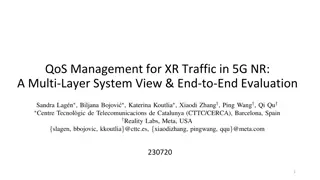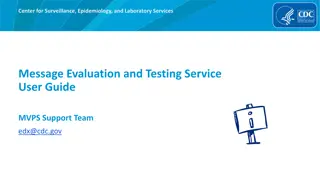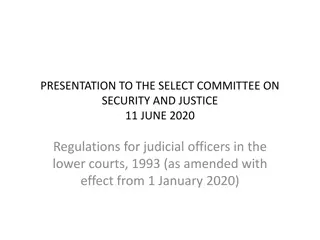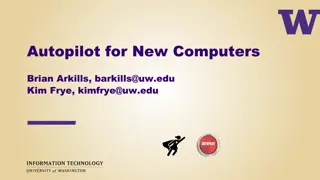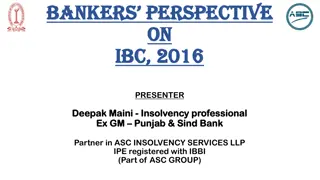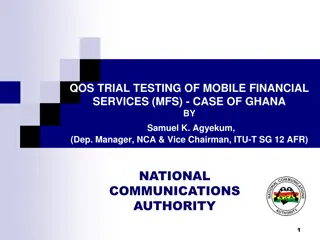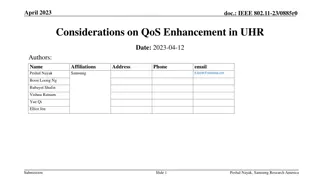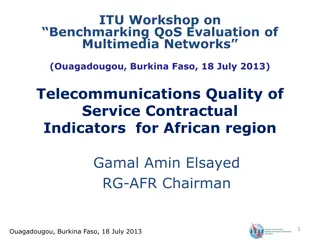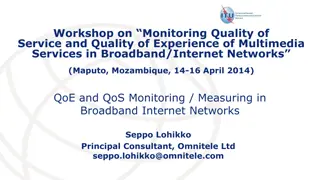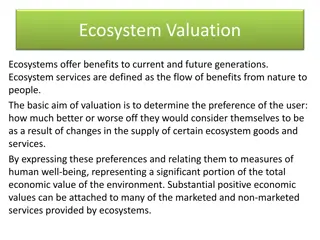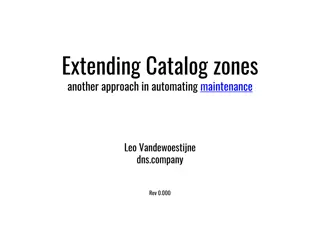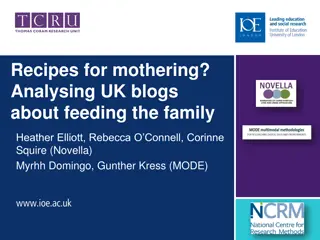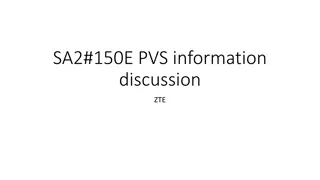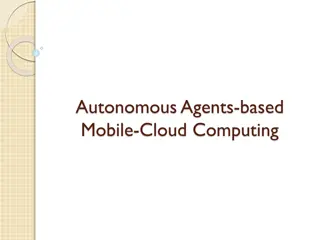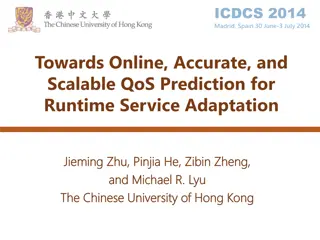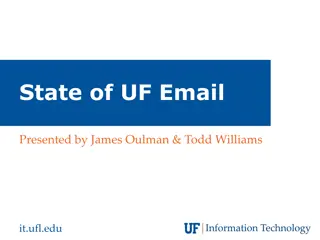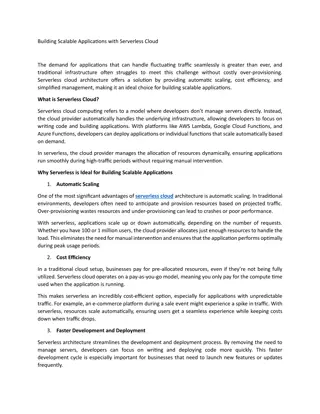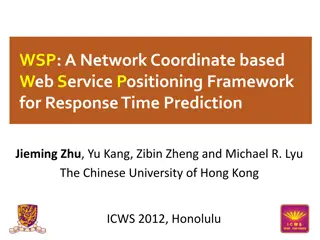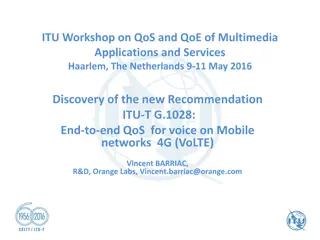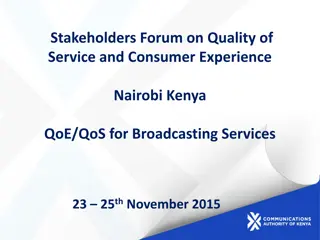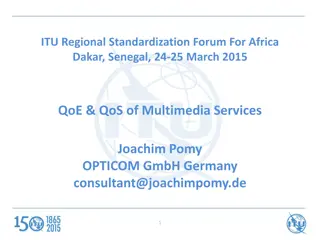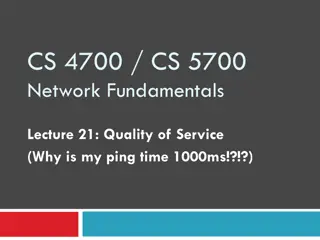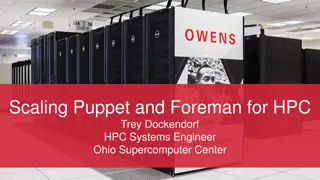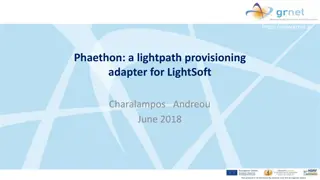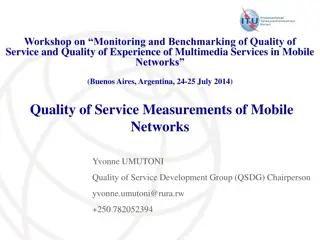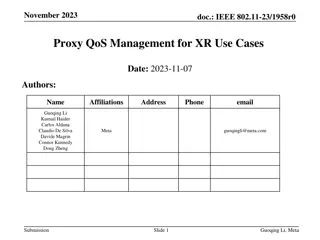Scrolls:Rolling Flexible Surfaces for Wideband Wireless
Revolutionizing wireless communication, the Scrolls project introduces rolling flexible surfaces for wideband wireless applications. With the expectation of 30 billion wireless devices by 2025, the project emphasizes standards and frequencies such as Cellular, Wi-Fi, and IoT. By offering a standard-
2 views • 19 slides
PORTFOLIO COMMITTEE ON HIGHER EDUCATION
The Portfolio Committee on Higher Education discussed various important topics in their recent meeting, including challenges with post provisioning norms, NSFAS updates for 2024, and student accommodation issues. SAPCO presented on TVET Colleges readiness for the 2024 academic year, addressing conce
0 views • 41 slides
5G NR Traffic QoS Management: Multi-Layer System View & End-to-End Evaluation
5G NR technology emphasizes enhanced QoS for XR traffic, including AR, VR, and Cloud Gaming. This research delves into handling QoS for XR/CG traffic at various layers, proposing QoS control mechanisms at the application and MAC layers, along with an evaluation of these approaches using a simulator.
6 views • 14 slides
Enhancing QoS Facility for Low-Latency High-Throughput Performance in IEEE 802.11 Networks
This proposal addresses the shortcomings in traffic classification and handling of uplink/downlink traffic in current IEEE 802.11 specifications, particularly in relation to low-latency traffic. It also highlights issues with the current EDCA mode in managing congestion and proposes high-level solut
5 views • 18 slides
Key Priorities and Progress in Early Childhood Development Implementation
Update on the key priorities for Early Childhood Development (ECD) implementation in 2024, focusing on mass registration, resource provisioning, scaling up access, parenting support, and improved coordination. The report discusses achievements over the last five years, challenges in access and quali
9 views • 41 slides
Proposal for PEMC Communicating with PEGC via 5GC Local Switch
The proposal suggests enabling PEMC to manage Personal Information Network (PIN) without AF vivo by communicating with PEGC via a 5GC local switch. This method allows for PIN management even when AF is not deployed, ensuring privacy concerns are addressed. The principle involves anchoring PDU Sessio
0 views • 4 slides
Comprehensive Guide to Message Evaluation, Testing, and Provisioning System (MVPS)
Explore the Message Evaluation, Testing, and Provisioning System (MVPS) used by the Center for Surveillance, Epidemiology, and Laboratory Services. MVPS streamlines data collection, collaboration, and provision of timely and accurate data, enhancing public health goals. Learn about the Components of
2 views • 13 slides
Narasimham Committee and Indian Banking Reforms
Narasimham Committee, established in 1991 and 1998, played a pivotal role in restructuring the Indian banking sector. The committees, headed by Shri M. Narasimham, addressed issues like low economic growth, non-performing assets, unsatisfactory customer service, and outdated banking systems. They in
0 views • 10 slides
Issues with SCS Operation in IEEE 802.11be Standard
The document discusses technical issues related to the SCS (Spatial Channel Sharing) operation in the IEEE 802.11be standard. It highlights inconsistencies in the standard regarding parameterized QoS requirements, mixing of traffic streams with different QoS needs, and challenges in prioritizing SCS
0 views • 15 slides
Regulations for Judicial Officers in Lower Courts: Presentation to Select Committee
This presentation outlines the regulations governing judicial officers in lower courts, focusing on leave categories, vacation leave provisioning, and the vacation leave cycle. It highlights the historical background, the Magistrates Act of 1993, and the recent amendments effective from January 1, 2
4 views • 26 slides
Time Synchronization in Cloud Gaming Services
Cloud gaming services like AIS, TSCAI, and TSC Assistance Container play a crucial role in providing quality of service (QoS) to millions of users globally. The need for time synchronization in 5G networks, especially for industrial applications like AR/VR, is highlighted. Trusted AF entities can di
0 views • 4 slides
Enhancing Network Performance with RoCE Technology
Remote Direct Memory Access (RDMA) benefits, RoCEv2 packet format, resilient RoCE feature progression, optimizing network performance with QoS, and RoCE congestion control convergence analysis are discussed in this proposal. RoCE technology offers low latency, high throughput, and efficient CPU usag
0 views • 19 slides
Autopilot for New Computers Project Overview
UW's Autopilot project aims to streamline the provisioning process for Windows computers, reducing the need for physical intervention by IT staff. Through cloud-based management, devices can be set up remotely with a UW image, addressing the challenges posed by the Covid-19 pandemic. By enabling Aut
0 views • 33 slides
Challenges Faced by Banks in Adopting IBC
Banks face challenges in adopting the Insolvency and Bankruptcy Code (IBC) due to stringent provisioning norms, additional costs, and complexities in referring cases to the National Company Law Tribunal (NCLT). Secured NPA accounts older than 2 years, unsecured NPA accounts in the second year, and c
0 views • 20 slides
Quality of Service (QoS) Trial Testing of Mobile Financial Services in Ghana
The National Communications Authority in Ghana conducted a QoS trial testing exercise on mobile financial services to assess compliance with QoS targets and consumer protection readiness. The test methodology involved using the SIGOS Integrated Test Environment system for billing verification on mob
5 views • 12 slides
Enhancing Quality of Service in Ultra High Rate Wi-Fi Networks
This document explores the potential improvements in Quality of Service (QoS) for Ultra High Rate (UHR) Wi-Fi networks, focusing on the benefits of timing information sharing for traffic urgency assessment. It discusses areas such as increased reliability, lower latencies, improved manageability, an
0 views • 11 slides
Layered QoS and Multi-Layer Transmission in IEEE 802.11-22 for Enhanced WLAN Performance
The document discusses the importance of layered Quality of Service (QoS) and multi-layer transmission in meeting the high throughput and real-time requirements of metaverse applications over WLAN. It emphasizes the need for enhanced throughput, reliability, reduced latency, and improved power effic
0 views • 11 slides
IEEE Std. 802.11-22/1017r0 Overview and Architecture Presentation
This presentation by Dorothy Stanley from HP Enterprise delves into the utilization of IEEE Std. 802.11-2020 standards focusing on the IEEE Std. 802 overview and architecture. It covers topics such as the use of LLC, MAC address formats, QoS mechanisms, MSDU formats, and various MAC services and pro
0 views • 10 slides
Enhancing Contractual Parameters for Telecommunications Quality in Africa
Workshop in Ouagadougou focused on benchmarking QoS evaluation of multimedia networks, highlighting the importance of QoS, priority of contractual matters, inadequacy of E-803 for African region, and the role of regulators in customer rights. Suggestions included additional contractual parameters to
1 views • 18 slides
Enhancing Multimedia Services in Broadband Networks through QoE and QoS Monitoring
Explore the significance of Quality of Service (QoS) and Quality of Experience (QoE) monitoring in broadband internet networks, as discussed at a workshop in Maputo, Mozambique. Learn about Omnitele's approach to measuring end-user QoS and QoE, aiming to maximize customer experience and minimize net
0 views • 38 slides
Understanding Ecosystem Valuation and Non-Market Techniques
Ecosystem valuation aims to assess user preferences for ecosystem goods and services, determining the economic value attached to nature's benefits. Ecosystems offer provisioning, regulating, cultural, and supporting services crucial for human well-being. Various non-market valuation techniques like
0 views • 5 slides
Automating DNS Maintenance with Catalog Zones: A New Approach
Explore a fresh method for automating maintenance in DNS servers through catalog zones, focusing on dynamic configuration data. Learn about generating includes for various DNS daemons and enhancing zone management efficiency. Discover how to streamline provisioning and loading processes with Python,
0 views • 12 slides
Unveiling Narratives of Mothering Through UK Blog Posts on Family Feeding
Delve into the exploration of mothering practices narrated through UK blog posts on family feeding. Learn about the methodological and ethical implications of working narratively and multimodally with blogs. Discover how blogs document family life, everyday mothering practices, and food provisioning
0 views • 14 slides
PELICAN: A Building Block for Exascale Cold Data Storage
PELICAN addresses the need for cost-effective storage of cold data in the cloud, offering exabyte-scale storage solutions. By provision resources specifically for cold data workloads, it optimizes storage efficiency and reduces unnecessary resources, resulting in high-density, low-cost storage with
0 views • 30 slides
Discussion on Provisioning Servers Addressing Information in 3GPP TS 23.501
Background CT4 LS in S2-2200200 issue 2 discussed the interpretation and intention of the addressing information for Provisioning Servers (PVS) as stated in 3GPP TS 23.501. The focus was on whether the provided PVS IP addresses and/or FQDNs are for a single PVS server or multiple servers and how the
0 views • 4 slides
Enhancing Mobile-Cloud Computing with Autonomous Agents Framework
Autonomous Agents-based Mobile-Cloud Computing (MCC) refers to moving computing tasks to powerful centralized platforms in the cloud, offering advantages like extending battery life and dynamic resource provisioning. However, an inflexible split of computation between mobile and cloud platforms lead
0 views • 22 slides
Scalable QoS Prediction for Service Adaptation in Service-Based Applications
This study delves into the challenge of predicting Quality of Service (QoS) for runtime service adaptation in service-based applications. It explores collaborative filtering and adaptive matrix factorization techniques for accurate QoS prediction, aiming towards enhancing service resilience and redu
0 views • 29 slides
Overview of UF Email System Evolution
Explore the evolution of the University of Florida (UF) email system, covering the past setups for students, faculty, staff, and other affiliates, as well as the transition to the current GatorLink Email system. Discover the background, mailbox locations, provisioning methods, and challenges faced b
0 views • 25 slides
Building Scalable Applications with Serverless Cloud
The demand for applications that can handle fluctuating traffic seamlessly is greater than ever, and traditional infrastructure often struggles to meet this challenge without costly over-provisioning.
0 views • 2 slides
Enhancing P2P Resource Management in IEEE 802.11 Networks
Discussion on improving P2P communication efficiency on base and off-channels in IEEE 802.11 networks, focusing on enhancements for better interaction between WLAN network and P2P groups. Emphasizes the importance of involving AP in QoS provisioning for P2P communications and proposes mechanisms to
0 views • 10 slides
Network Coordinate-based Web Service Positioning Framework for Response Time Prediction
This paper presents the WSP framework, a network coordinate-based approach for predicting response times in web services. It explores the motivation behind web service composition, quality-of-service evaluation, and the challenges of QoS prediction. The WSP framework enables the selection of web ser
0 views • 30 slides
Introduction to ITU-T G.1028: End-to-End QoS for VoLTE on 4G Networks
This overview covers the journey and development of ITU-T G.1028, focusing on end-to-end quality of service (QoS) for Voice over LTE (VoLTE) on 4G networks. It details the background, key milestones, essential elements of VoLTE services, optional mechanisms considered, QoS classifications, and call
0 views • 14 slides
Comprehensive Overview of Forefront Identity Manager (FIM)
Forefront Identity Manager (FIM) is a Microsoft solution that applies business rules to manage Active Directory accounts effectively. It streamlines account provisioning, de-provisioning, and attribute management for various user categories like students, employees, alumni, and retirees. FIM central
0 views • 11 slides
Evolution of QoS/QoE in Broadcasting Services
Consumers and regulators are driving the need for established Quality of Service (QoS) and Quality of Experience (QoE) standards in broadcasting services. Stakeholders in Nairobi discussed the importance of ensuring signal quality, video/audio performance, and transmission metrics to meet subscriber
0 views • 12 slides
Understanding Quality of Experience (QoE) and Quality of Service (QoS) for IPTV Services
Explore the concepts of QoE and QoS for IPTV services, including user requirements, important definitions, QoE dimensions, compression artifacts, and components affecting channel zapping time. Learn about clean audio, VoD trick modes, triple play services, and more in this informative collection.
0 views • 13 slides
Understanding Quality of Service (QoS) in Network Fundamentals
Network Fundamentals Lecture 21 delves into Quality of Service (QoS) in networking, addressing the importance of prioritizing certain types of traffic based on factors like application performance, traffic importance, and service levels. The lecture explores the challenges of sharing resources among
0 views • 29 slides
Scaling Puppet and Foreman for HPC by Trey Dockendorf
Introduction to Puppet configuration management and Hiera YAML data for Foreman provisioning in an HPC environment, emphasizing the motivation and requirements for scaling provisioning and management in large HPC centers using Foreman's host life cycle management, key-value storage, NFS root provisi
0 views • 16 slides
Overview of Phaethon: LightPath Provisioning Adapter for LightSoft
Phaethon is a lightpath provisioning adapter designed for LightSoft, providing capabilities such as reconfigurable optical add-drop multiplexing and transponder filtering. It integrates with the GRNET OSS/BSS stack and facilitates operations like transforming CORBA calls to HTTP REST calls and manag
0 views • 25 slides
Workshop on Monitoring and Benchmarking of Quality of Service and Quality of Experience in Mobile Networks
Presentation focusing on quality of service monitoring and enforcement in mobile networks from a regulatory viewpoint. Covers purposes of QoS regulations, requirements for regulators, auditing methods, and QoS parameters for mobile services.
0 views • 14 slides
Proxy QoS Management for XR Devices in IEEE 802.11-23/1958r0 - November 2023
This document discusses the challenges faced by XR devices in terms of size, thermal constraints, cost, and power limitations leading to the proposal of Proxy QoS Management to enhance Wi-Fi performance. The aim is to leverage TGbn devices for improving legacy devices' connectivity within a Wi-Fi ne
0 views • 6 slides


